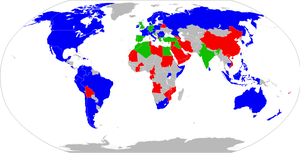This article needs to be updated. (May 2014) |
| Impact of the Arab Spring | |
|---|---|
| Part of International reactions to the Arab Spring | |
 Locations of global protests in 2011. Blue refers to Occupy movement protests, red refers to Arab spring and later protests, and green refers to protests inspired by the Arab Spring outside the Occupy movement. | |
| Date | Early 2011–2012 |
| Location | Worldwide outside the Arab countries |
| Caused by | Arab Spring |
The impact of the Arab Spring concerns protests or by the way attempts to organize growing protest movements that were inspired by or similar to the Arab Spring in the Arab-majority states of North Africa and the Middle East, according to commentators, organisers, and critics.[1] These demonstrations and protest efforts have all been critical of the government in their respective countries, though they have ranged from calls for the incumbent government to make certain policy changes to attempts to bring down the current political system in its entirety. In some countries, protests have become large or widespread enough to effect change at the national level, as in Armenia, while in others, such as Djibouti, were swiftly suppressed.[2]
Protests considered to be inspired by the Arab Spring have taken place on every inhabited continent, with varying degrees of success and prominence.[3] On 15 October 2011, the subsidiary "Occupy" and Indignants movements inspired protests in 950 cities in 82 countries.
- ^ Akaev, A., et al.(2017). Technological development and protest waves: Arab spring as a trigger of the global phase transition?. Technological Forecasting and Social Change, 116, 316-321.
- ^ For quantitative estimates of the global impact of the Arab Spring see Andrey Korotayev, Kira Meshcherina & Alisa Shishkina (2018) A Wave of Global Sociopolitical Destabilization of the 2010s: A Quantitative Analysis, Democracy and Security, DOI: 10.1080/17419166.2018.1517337
- ^ Korotayev, A., Meshcherina, K., & Shishkina, A. (2018). A Wave of Global Sociopolitical Destabilization of the 2010s: A Quantitative Analysis. Democracy and Security, 14(4), 331-357.